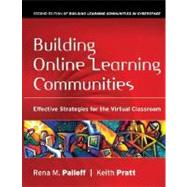
Note: Supplemental materials are not guaranteed with Rental or Used book purchases.
Purchase Benefits
What is included with this book?
| List of Exhibits | |
| Preface to the Second Edition | |
| Acknowledgments | |
| The Authors | |
| The Learning Community in Online Learning | |
| When Teaching and Learning Leave the Classroom | |
| Online Issues and Concerns | |
| Students Online | |
| Making the Transition and Establishing Presence | |
| The Search for Knowledge and Meaning in the Online Classroom | |
| Putting the Pieces Together | |
| New Approaches, New Skills | |
| Implications | |
| Recontextualizing Community | |
| The Importance of Community | |
| Community Online | |
| The Element of Social Presence | |
| Coalescence and Belonging Online | |
| Recontextualizing Community | |
| Community in the Virtual Classroom | |
| Participation and Desired Outcomes in the Online Classroom | |
| The Human Side of Online Learning | |
| The Need for Human Contact | |
| Connectedness and Coalescence | |
| Shared Responsibility, Rules, and Norms | |
| Roles and Participation | |
| Shadow Issues: The Issues We Simply Don't Want to Face | |
| Other Psychological Issues | |
| Ritual as the Psychological Expression of Community | |
| Spiritual Issues | |
| Culture and Language Issues | |
| Vulnerability, Ethics, and Privacy | |
| Final Thoughts | |
| Practical Considerations in Online Learning | |
| About Time | |
| Group Size | |
| Cost and Other Administrative Issues | |
| Online Security | |
| Managing the Relationship to Technology | |
| The Relationship of Person to Machine | |
| Technology as a Facilitative Tool | |
| Excuse Us, We Are Now Experiencing Technical Difficulties | |
| Moving Teaching and Learning Online | |
| Effective Teaching and Learning in the Online Classroom | |
| Roles and Functions of the Instructor in the Online Classroom | |
| The Role of the Learner in the Learning Process | |
| The Hybrid Course and Online Community | |
| Moving to Specifics | |
| Part 2 | |
| Building Foundations | |
| Creating an Effective Course Design | |
| Constructing the Online Course Site | |
| If You Build It, Will They Come? Final Thoughts | |
| Guiding Questions to Assist in Building an Effective Course Syllabus | |
| Evaluating an Effective Online Course | |
| Promoting Collaborative Learning | |
| Formulating a Shared Goal for Learning | |
| Problems, Interests, and Experiences as Springboards for Learning | |
| Dialogue as Inquiry | |
| Encouraging Expansive Questioning | |
| Sharing Responsibility for Facilitation | |
| Promoting Feedback | |
| Intergroup and Other Forms of Collaboration | |
| Final Thoughts | |
| Guiding Questions to Promote Collaborative Learning | |
| Transformative Learning | |
| The Process of Transformative Learning in the Online Classroom | |
| Learning About Learning Through the Use of Technology | |
| Creating Opportunities to Encourage Reflection on the Differences | |
| Learning About Technology by Using It | |
| Encouraging Questions and Comments About the Technology | |
| Self-Reflection | |
| Final Thoughts: We Are the Experts When It Comes to Our Own Learning | |
| Guiding Questions to Promote Transformative Learning | |
| Student Assessment and Course Evaluation | |
| Assessment and Evaluation Basics | |
| Student Performance | |
| Course Evaluation | |
| Program Evaluation | |
| Final Thoughts | |
| Questions to Consider in Student, Course, and Program Evaluation | |
| Lessons Learned and a Look Ahead | |
| The Six Essential Elements | |
| The Essence of Online Learning: Community | |
| Unresolved Issues and Unanswered Questions | |
| Lessons Learned and a Look to the Future | |
| Extending Community Beyond the Classroom | |
| Implications for Instructor Training | |
| Examples of Course Syllabi | |
| Table of Contents provided by Publisher. All Rights Reserved. |
The New copy of this book will include any supplemental materials advertised. Please check the title of the book to determine if it should include any access cards, study guides, lab manuals, CDs, etc.
The Used, Rental and eBook copies of this book are not guaranteed to include any supplemental materials. Typically, only the book itself is included. This is true even if the title states it includes any access cards, study guides, lab manuals, CDs, etc.